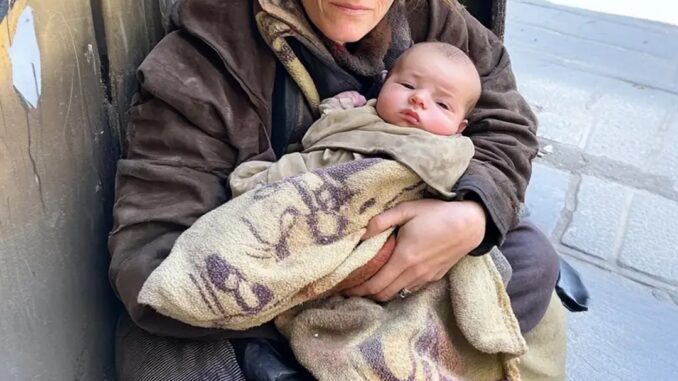
At 75, my life had become a quiet existence, filled with memories of the past and the silence that echoed through my home. That all changed the day I met Julia, a young mother sitting alone by the roadside with her baby. What began as a simple act of compassion unfolded into a story of desperation, heartache, and the unexpected bond that would bring new life into my world.
My days often blurred together. Since my daughter, Gianna, passed away three years ago, I had lived in the quiet shadow of loss. My son, Sebastian, lived in another city, busy with his own family and career. We spoke occasionally, but his visits were rare. I understood, of course—life moves forward, pulling us in different directions. But the silence in my home had become a constant companion.
One afternoon, while returning from my routine grocery trip, I noticed her—a young woman sitting on the curb, cradling a baby wrapped in a thin, tattered blanket. Her posture was weary, her face hidden, but something about her drew me in. Maybe it was the way she held the baby so protectively or the exhaustion etched into her expression when she finally looked up. In that fleeting moment, she reminded me of Gianna.
I couldn’t just walk by.
“Do you need help, dear?” I asked gently, stepping toward her.
Startled, she looked up and whispered, “I don’t want to be a burden.”
“Nonsense,” I replied. “You and the baby need a warm place. Come with me.”
Hesitant, she eventually nodded. We walked in silence to my home, her baby boy stirring slightly in her arms. Inside, I offered her tea and a seat. My house, which had felt so cold and lifeless, suddenly seemed to warm with their presence.
“What’s your name?” I asked, handing her a steaming cup.
“Julia,” she answered softly. “And this is Adam.”
Over the following days, Julia and Adam stayed with me. She found a job at a local grocery store, and I cared for Adam while she worked. His laughter filled the house, and I felt a joy I hadn’t experienced in years. Life, it seemed, had returned.
One evening, as we sat together after dinner, Julia shared bits of her past. She had a five-year-old daughter, Aurora, who was in a charity hospital, gravely ill. She didn’t speak much about it, but I could see the pain in her eyes.
Then one afternoon, everything shifted.
Returning home from my book club early, I found Julia rifling through my bedroom drawers. My jewelry, loose cash, and my mother’s brooch were scattered on the floor.
“Julia?” I gasped, heart sinking.
She turned, tears already streaming down her face. “I can explain,” she stammered, dropping everything. “I wasn’t going to steal. I just… Aurora’s surgery… I can’t afford it, and I can’t lose her.”
Her words broke the silence between us. I saw the fear and desperation in her eyes, and despite my hurt, my heart softened. I knew what it was like to lose a child.
I knelt beside her, gently placing a hand on her shoulder. “You should have told me,” I whispered. “I could have helped.”
Tears flowed down her face as she admitted, “I was ashamed. You’ve done so much for us already.”
“We’ll figure this out together,” I reassured her. “You don’t have to go through this alone.”
In that moment, I made a decision. The next morning, I began calling friends, neighbors, and former students. Word spread quickly, and soon the whole community came together. We organized a fundraiser—an auction, bake sale, and even a play—raising every penny needed for Aurora’s surgery.
The day of Aurora’s surgery was filled with anxious waiting, but hours later, the doctor emerged with good news. The surgery had been a success. Julia collapsed into my arms, overcome with relief.
Afterward, Julia and the children returned to my home, but this time, it didn’t feel like a temporary arrangement. The once quiet, empty house was now filled with laughter, toys, and the love of a new family. One evening, as we sat together at the dinner table, I looked at Julia and the children, a deep sense of contentment washing over me.
“Stay,” I said suddenly. “You and the kids. This house needs life—and you’ve become like family.”
With tears in her eyes, Julia asked, “Are you sure?”
“I’ve never been more certain of anything,” I replied.
And just like that, the house wasn’t empty anymore. It was full of laughter, warmth, and love—the kind of family not bound by blood, but by something far more profound.
Leave a Reply